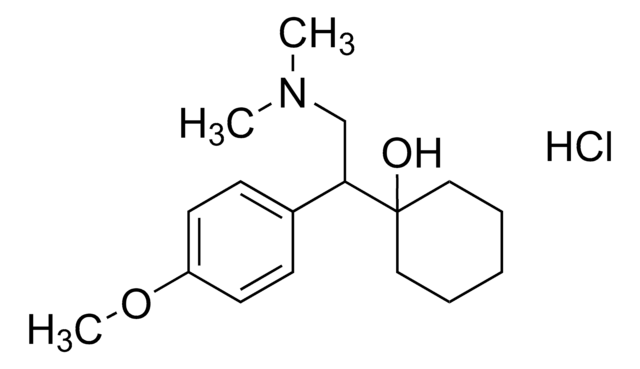1711268
USP
Venlafaxine hydrochloride
United States Pharmacopeia (USP) Reference Standard
Synonym(s):
(+/-)-1-[2-(Dimethylamino)-1-(4-methoxyphenyl)ethyl]cyclohexanol hydrochloride, Effexor
About This Item
Recommended Products
grade
pharmaceutical primary standard
API family
venlafaxine
manufacturer/tradename
USP
application(s)
pharmaceutical (small molecule)
format
neat
SMILES string
Cl[H].COc1ccc(cc1)C(CN(C)C)C2(O)CCCCC2
InChI
1S/C17H27NO2.ClH/c1-18(2)13-16(17(19)11-5-4-6-12-17)14-7-9-15(20-3)10-8-14;/h7-10,16,19H,4-6,11-13H2,1-3H3;1H
InChI key
QYRYFNHXARDNFZ-UHFFFAOYSA-N
Gene Information
human ... SLC6A2(6530) , SLC6A4(6532)
Looking for similar products? Visit Product Comparison Guide
General description
Application
Also used to prepare standard, system suitability, and standard stock solution for assay, impurity analysis, and performance test according to the given below monographs of United States Pharmacopeia (USP):
- Venlafaxine Hydrochloride
- Venlafaxine Tablets
- Venlafaxine Hydrochloride Extended-Release Capsules
- Desvenlafaxine
Biochem/physiol Actions
Analysis Note
Other Notes
Hazard Statements
Precautionary Statements
Hazard Classifications
Aquatic Chronic 2
Storage Class Code
11 - Combustible Solids
WGK
WGK 3
Flash Point(F)
Not applicable
Flash Point(C)
Not applicable
Certificates of Analysis (COA)
Search for Certificates of Analysis (COA) by entering the products Lot/Batch Number. Lot and Batch Numbers can be found on a product’s label following the words ‘Lot’ or ‘Batch’.
Already Own This Product?
Find documentation for the products that you have recently purchased in the Document Library.
Our team of scientists has experience in all areas of research including Life Science, Material Science, Chemical Synthesis, Chromatography, Analytical and many others.
Contact Technical Service



